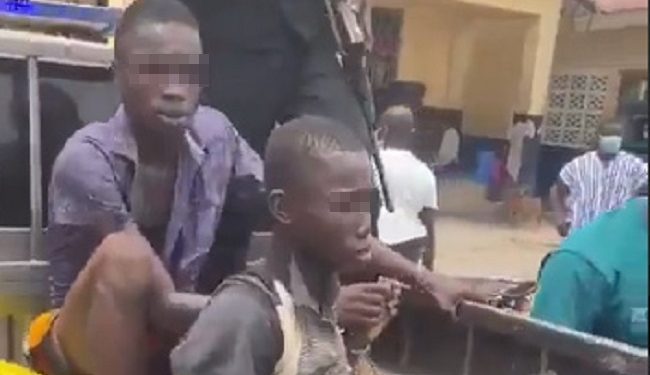Justice at Last: Sentencing of Teenagers in Ghana’s Notorious Kasoa Ritual Murder Case

In 2021, a brutal and deeply disturbing crime shocked Ghana, leaving its people outraged and calling for justice. Two teenage boys from Kasoa, Felix Nyarko and Nicholas Kini, were arrested after it was discovered they had lured, attacked, and killed 10-year-old Ishmael Mensah for money rituals. This shocking crime, believed to have been inspired by a witch doctor’s advertisement on television, has now finally seen a resolution. After four years, a Ghanaian court has sentenced Nicholas Kini, now 22, to life in prison, marking a significant moment in a case that stirred national debate on the impact of ritualistic beliefs, youth influence, and justice.
The Crime: A Heinous Act Rooted in Deception and Desperation

In April 2021, Ishmael Mensah was lured into an unfinished building by Felix Nyarko, his 15-year-old friend and neighbor, who baited him with the promise of playing video games. Little did Ishmael know that Nicholas Kini, 18 at the time, lay in ambush inside the building, armed with a heavy stick and cement blocks. As Ishmael entered, Kini struck him repeatedly, eventually burying him in a shallow grave. In police custody, the teenagers claimed they had been motivated by a television commercial promising wealth through supernatural means. After reaching out to the advertised witch doctor, they were told that wealth would come, but only through the life of another.
Media and Influence: Television Ads and the Allure of Wealth
The case not only captured public outrage but also highlighted a deeper social issue—the role of media in shaping aspirations and behaviors among vulnerable youth. Television advertisements promoting supernatural solutions and quick paths to riches have a substantial reach, particularly among impressionable young people. The presence of a witch doctor’s ad on prime-time television, portraying ritual sacrifices as an accepted means to attain wealth, calls into question the responsibility of advertisers and regulators. In response, advocacy groups, including Ghana’s National Media Commission, have urged for stricter regulations on such content. “The media has a duty to safeguard young minds, not to lead them astray,” said a spokesperson for Media Foundation for West Africa.
The Legal Battle: Seeking Justice in the Courtroom
This tragic incident prompted widespread calls for justice. In the four years that followed, the Kasoa case brought intense public scrutiny on Ghana’s judicial process. Ghanaian prosecutors presented detailed evidence, including eyewitness accounts, autopsy findings, and psychological assessments of the perpetrators. Public interest in the case grew as debates on juvenile sentencing and rehabilitation arose, with many calling for accountability for both the boys and the external influences that fueled their actions. Nicholas Kini’s recent life sentence was welcomed by some as a necessary deterrent, while others questioned the role of society in failing to protect young minds from destructive influences.
Societal Responsibility: Addressing Ritual Beliefs and Youth Vulnerability
The Kasoa case has reignited discourse around ritualistic beliefs and youth vulnerability. In parts of West Africa, including Ghana, beliefs in supernatural wealth are widespread, often encouraged by so-called spiritual advisors and witch doctors. The influence of such beliefs on vulnerable populations—especially the youth—is a cause for concern. Psychologist Dr. Ama Boadu emphasizes that “without guidance, adolescents may misinterpret societal messages about success and resort to harmful practices in the pursuit of wealth.” This case highlights an urgent need for education, community intervention, and open discussions to dismantle these harmful ideologies.
Verdict and Aftermath: Reflecting on Justice and Prevention
The life sentence for Nicholas Kini brings a sense of closure for Ishmael’s family and the community of Kasoa. Felix Nyarko’s sentence, though lighter due to his age, reflects the court’s recognition of his involvement and the role of external influences on his actions. Yet, the case remains a cautionary tale, urging parents, educators, and lawmakers to vigilantly monitor the impact of media and social influences on youth.
Conclusion: A Call for Vigilance and Reform
The tragic killing of Ishmael Mensah serves as a stark reminder of the vulnerability of youth, the power of media, and the persistence of dangerous beliefs. As Ghana processes this verdict, there is a call for vigilance and reform to protect young people from similar influences. The Kasoa case urges all of us to critically examine how media, society, and community leaders shape the values of the next generation. By addressing these issues head-on, Ghana can work to prevent such tragedies in the future, ensuring justice is not only served after the fact but also safeguarded in the lives of its youth.

